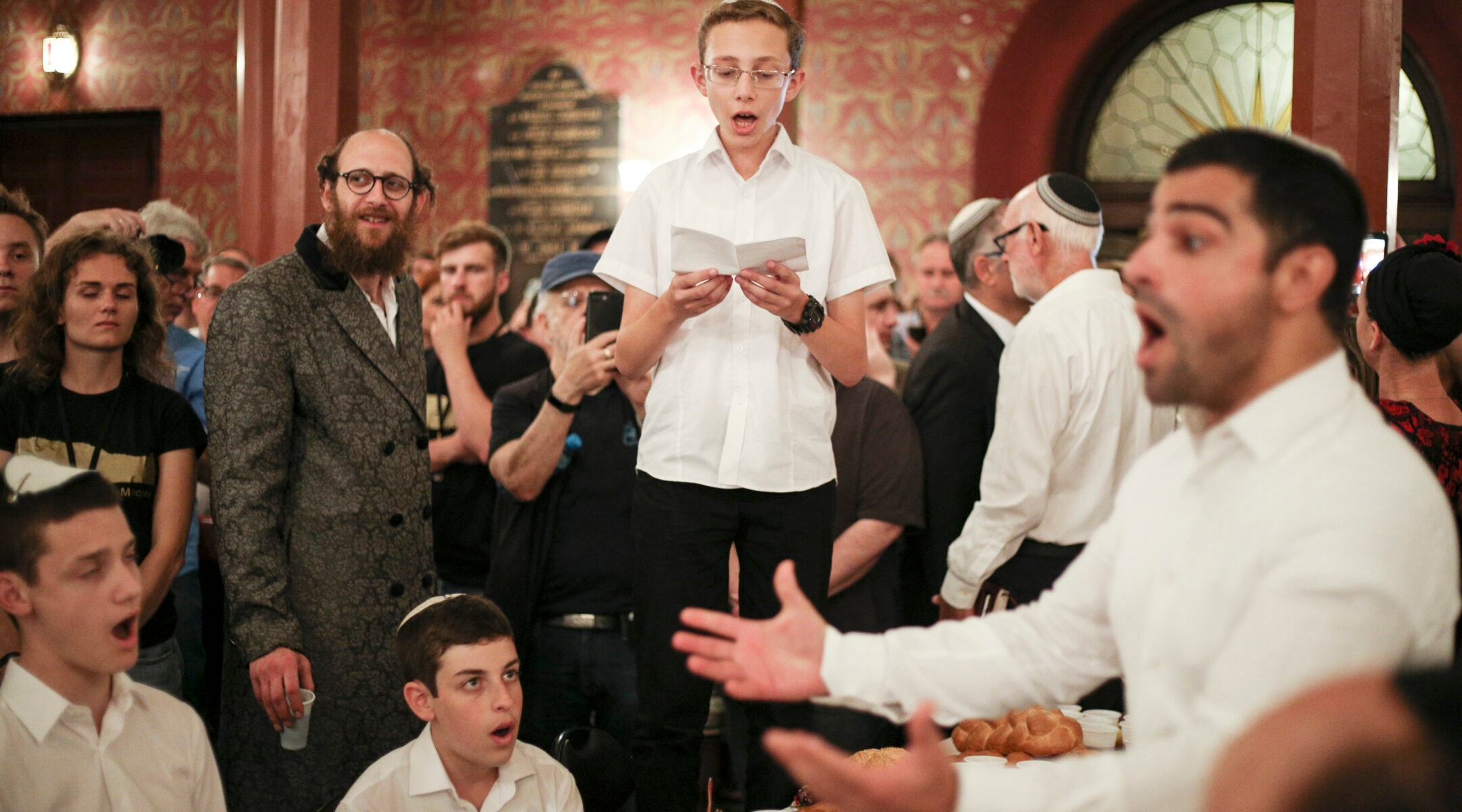(JTA) — I’m dreading the High Holidays this year, but for all the wrong reasons.
I’m not feeling much of the existential dread that’s supposed to come from musing on how the books of life and death will soon be open before the King of Kings. And although I fear the course of the coronavirus pandemic and the lives it will upend in the coming year, that’s not what I’m talking about either.
Rather I’m worried about something far less important: how the prayer service will be different. My trepidation concerns all of the majestic Hebrew poetry that will be skipped, the words that will be hurriedly muttered under a mask and the lack of swaying bodies beseeching God in unison. And to be honest, I’m going to miss the singing most of all.
Since I’m Orthodox, I can’t use technology during the holiday, so I’m left with toughing it out alone at home or braving what will certainly be a pared-down in-person service. Based on rabbinic guidance, many Orthodox synagogues open for the holidays will heavily abridge the davening, or prayer. And when you’re looking to shorten things, the easiest stuff to take out is the Hebrew poetry, or piyyutim, and the soulful congregational singing. In fact, you can kill two birds with one stone: Singing is one of the easiest ways to spread the virus anyway.
For me, however, the High Holiday prayers are a collection of peak experiences and transcendent moments centered around song. I will never forget the booming baritone of Rabbi Aryeh Hendler at Yeshivat Shaalvim, where I spent my gap year in Israel. I fondly recall the voices of hundreds of students echoing off the vaulted ceiling of Yeshiva University’s community shul on 185th Street in Manhattan’s Washington Heights. And then there’s the year I got to experience Yom Kippur at the Hebrew Institute of Riverdale graced by the angel-sweet prayers of Elli Kranzler. (You, too, can experience some of the magic this year with his newly released Rosh Hashanah album on Soundcloud.)
In recent years, I have sometimes led substantial portions of the High Holiday services at a couple of local synagogues. For at least a month before the holidays I practice the words, melodies and cantorial flourishes constantly: in the car, while washing dishes, even under my breath when walking down the street. I may not be sufficiently possessed by thoughts of judgment and repentance, but I am certainly obsessed with their sound.
But this year, without the music to keep me going, there is a part of me that doesn’t want to attend shul at all. Maybe I should abscond to my basement and sing the service to myself, taking comfort in the words and tunes I know so well. The pretend version might be better than the real thing. I suddenly understand why the Hasidic masters of old went out to the fields alone to commune with God. Yet I am also ashamed of such thoughts: Could I turn away from my congregation, even in its reduced state, on the holiest days of the year? And to abandon them in this year of all years! Have I become so invested in song that I have forgotten about sincere prayer?
Perhaps I need to rethink the place of music in prayer. Jewish tradition, as it turns out, is sometimes ambivalent about it in the first place. The Talmud (Gittin 7a) proclaims instrumental music forbidden following the destruction of the Temple. It brings too much joy when the Jewish people are supposed to be in mourning.
While this prohibition has been softened over time, and vocal music has almost universally been considered permissible, there have sometimes been vigilantes who felt otherwise.
Rabbi Leone Modena records that one Shabbat in Ferrara, Italy, in 1605, when a synagogue choir got up to enhance the prayers, another man stood up to drive them away, arguing that music has been forbidden since the Temple was destroyed. And in the latter half of the 19th century, when the battles between Orthodoxy and Reform in Western Europe were at their fiercest, Rabbi Yosef Zechariah Stern, in a responsum opposing certain Reform synagogue innovations, remarked that “in prayer, which is a substitute for the service of the heart, there is no place for melodies, only the uttering of the liturgy with gravity.”
The dominant view, however, is quite different. As the 13th-century Sefer Hasidim writes, “When you pray, use those tunes that are pleasant and sweet in your eyes.” There are long-lived and varied liturgical music traditions throughout the Jewish world borrowing from Western and Eastern musical modes and motifs. Nowadays, many synagogues value congregational singing as well.
But maybe the dissenters also have a point. Too much focus on the aesthetics of prayer can bring divided motivations and detract from prayer itself. The Shulhan Arukh, the widely accepted 16th-century code of Jewish law by Rabbi Yosef Karo, chastises a “leader who lengthens the prayer” if he “intends to … rejoice in his [own] voice,” although praises one who uses his sweet voice to “give thanks to God.”
Perhaps this dichotomy is expressed no better than by a non-Jew, the church father Augustine of Hippo in his “Confessions.” He writes that he is “inclined to approve of the custom of singing in church,” but only so that “weaker spirits may be inspired with feelings of devotion.” Why? He continues: “When I find the singing itself more moving than the truth which it conveys, I confess that this is a grievous sin, and at those times I would prefer not to hear the singer.”
Augustine speaks to the same concern as Karo: How does one know whether they are having an authentic religious experience or just like the music? Many years ago I posed this dilemma in passing to a friend, asking how, when he leads the High Holiday services, he navigates between prayer and performance. He was somewhat taken aback by the question. For him, there was no performance. He saw himself, I suppose, in the service of the congregation and in the thrall of God.
When I am honest with myself, however, I am not always as sure where my motivations lie. Of course, I am singing to inspire others, but to what extent am I also singing just for myself, to create my own peak religious experience?
And maybe this is where I’ve gone astray. If I take a step back, song is important not because it makes me feel good, or even because it personally brings me closer to God, but because it has the power to bring the congregation together. True, I may feel connected to God through song, but far more important is how the music can connect the worshippers to each other and direct their thoughts to God collectively.
When the prayer leader chooses a good tune, one that brings everyone present to join their voices in unison, it can change the entire tenor of the prayers. When properly directed, the congregation increases its devotion with the intensity of the song. Heartfelt song can make everyone laser focused on what we are really asking for from God. There are moments, evoked by song, when I not only feel the palpable presence of God, but when I am connected to everyone in the room around me.
Indeed, this time of year is all about interdependence: Repentance is not just between me and God, but about righting the wrongs I’ve done to others. When we confess our sins in the synagogue on Yom Kippur, we first do it silently to ourselves, but then we repeat it together in unison with a tune that seems far too upbeat for the occasion. By the time Yom Kippur is over in fact, we’ve repeated this ebullient confessional five times. But that’s the point: There is confidence in numbers, and we can’t get through the Days of Awe alone.
This year, paradoxically, coming together is all about staying apart. By taking steps to keep the virus at bay, we are holding onto each other, preserving ourselves and our communities for a different, better year. So perhaps we can harness the emotions of heartfelt song and the transcendent feelings of unity they evoke by directing them into a new High Holiday service where we respect each other, appropriately distance and gather only to the extent that is safe. By doing so, we are singing in our hearts, even if not out loud.
JTA has documented Jewish history in real-time for over a century. Keep our journalism strong by joining us in supporting independent, award-winning reporting.







